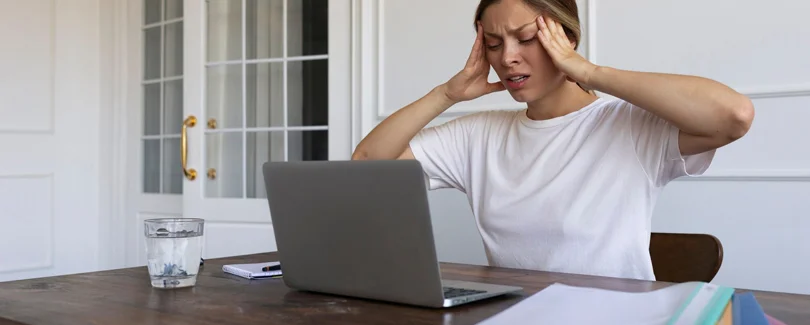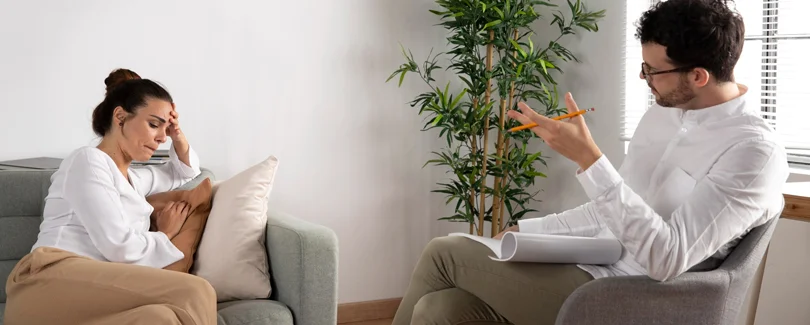Anxiety is a feeling of unease, nervousness, and fear about a particular event or situation with unknown outcomes. It is very common for people to feel anxiety anywhere. Research has shown that almost 30% of people in America experience anxiety in their lifetime. But crippling anxiety is a debilitating situation that makes your life miserable. It can affect your daily life and functioning, leading to fear, chronic pain, and intense levels of anxiety. This article talks about crippling anxiety meaning, what crippling anxiety feels like, its symptoms, and the possible treatment options for this.
What is Crippling Anxiety?
Crippling anxiety is a common expression, it is not a clinical term but used to describe severe anxiety or an anxiety disorder. It is a severe form of anxiety that can interfere with the ability to function in day-to-day life. It’s caused by persistent worry, difficulty paying attention, irritability, muscle tension, insomnia, OCD, or sleep disturbances. For example, feeling nervous or having butterflies in your stomach before you are about to give a presentation is typical and expected. However, anxiety that occurs frequently and interferes with your ability to complete daily tasks or participate fully in your life may be an indication of an anxiety disorder.
Read More: A clear understanding of the fact that can Anxiety cause Chest pain
Crippling Anxiety Symptoms
Anxiety has different types and symptoms vary from type to type. The most common types of symptoms include fear, nervousness, and uneasiness. But if we deep dive into the symptoms of crippling anxiety, we can divide the indications into three categories:
- Physical symptoms
- Thought patterns
- Behavior
Physical Symptoms
If a person feels crippled with anxiety, he must experience these physical symptoms of crippling anxiety in their body. It includes muscle tension, racing or pounding heart, eating disorder, sweating more than usual, restlessness, shortness of breath, depression, and mood changes.
Read More: Anxiety and Eating Disorders: Understanding the link
Thought Patterns
Changes in thought patterns are related to the emotional side, which is why we can call them emotional symptoms. These emotional indications include constant worrying that leads to depression, believing the worst, or overgeneralizing. These symptoms can make the diagnosis difficult, as they are also included in obsessive-compulsive disorder (OCD).
Read More: Can OCD Cause Social Anxiety? A Complex Relationship
Behavior Changes
There will be several behavioral changes that are known as the symptoms of debilitating anxiety and you can see what does crippling anxiety feel like? These indications include social withdrawal because of mood changes, which can cause mood disorder, specifically, bipolar disorder, seeking reassurance, and compulsive actions.

What Triggers Compulsive Anxiety
Why do I have crippling anxiety? This question might disturb you if you feel the signs of anxiety. From what’s crippling anxiety to treatment for crippling anxiety, everything will be covered in this article. Anxiety crippling is deteriorating your health and multiple factors are considered as the risk factors for this. These can be environmental and genital. Some common triggers for crippling anxiety might include:
- Stressful life events
- A death in the family
- Divorce
- Job loss
- A traumatic experience like being involved in a car accident or witnessing violence
- Substance abuse
- Family history
Read More: Different levels of Anxiety & stages of anxiety recovery
How to Deal with Crippling Anxiety?
If you feel like “my anxiety is crippling me”, do not worry. It is a common disease that can be treated with multiple treatment options. The most common treatment for mental health problems is psychiatric medication management. The others include therapies and self-care.
Psychiatric Medication Management
Imagine your child coming to you and saying “I have crippling anxiety”, you won’t believe him until you observe the symptoms yourself. But that will take it too far, making it difficult to treat it with self-care. That is when medication management service from Inland Empire Behavioral Group comes in. We offer medication management and all mental health services along with telehealth options.
Read More: The Ultimate Guide to Anxiety Symptoms in Women
Remedial Treatment or Therapies
Therapies are the best option for treating mental health problems without medication. The most common therapy is psychotherapy, also known as talk therapy. Specifically for anxiety, we use cognitive behavioral therapy and interpersonal therapy. It helps you manage your mood, helping in getting rid of mood disorder, and controlling fearfulness.

Self-Care
Self-care is also a good option for managing crippling anxiety if you are in the initial phases. You can manage it by sleeping regularly for 8 hours, drinking a lot of water, exercising for 30 minutes, and spending time with yoga, meditation, etc. If you don’t pay attention to your anxiety for a long time, it leads to other mental health problems, causing hallucinations and delusions, resulting in psychosis.
Read More: We Need To Talk About Anxiety Tingling
The best treatment for crippling anxiety is a combination of therapy and medication.
Inland Empire Behavioral Group Define Crippling Anxiety
According to the Inland Empire Behavioral Group, crippling anxiety is a type of anxiety that can create disturbances in your daily functioning and also affects your mental peace. But we have experts who offer evidence-based solutions for all mental health disorders. If you need any kind of help or treatment, we are here to serve you with clinical and telehealth services.
Read More: Know About The Difference Between Anxiety Tingling and MS Tingling
Conclusion
People must seek help for debilitating anxiety. Due to the nature of anxiety, it may be daunting for a person to get support from a mental health professional. However, therapy is a highly effective and long-lasting treatment to help people develop tools to manage their anxiety. Anyone who is experiencing debilitating anxiety may consider making an appointment with a mental health professional from Inland Empire Behavioral Group.
